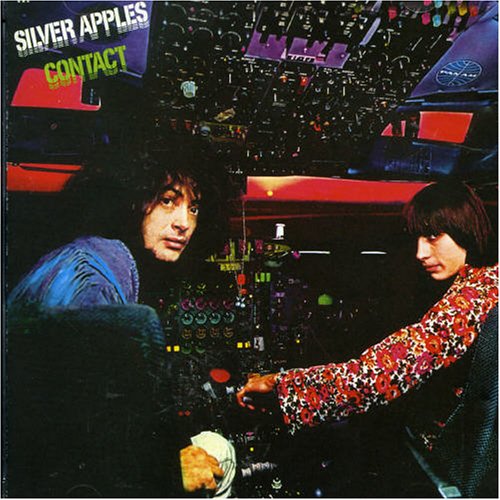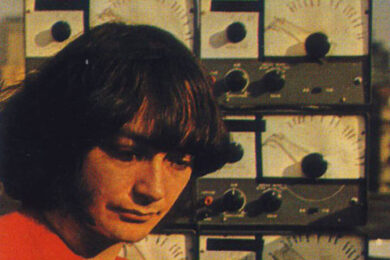At ATP’s Nightmare Before Xmas in December 2007 I was watching Aphex Twin DJ one of his astounding 3am rave sets when something odd happened.
To my immediate left, Damo Suzuki, the former frontman of Can, who was in a wheelchair at the time, rolled to halt. Then a few minutes later, one half of the legendary Silver Apples, Simeon, stood to my left. Both figures were transfixed by the escalating bpms, the acid bass and siren FX.
It was The Quietus’ pleasure in 2010 to have Simeon as Silver Apples playing on our Village Mentality Stage at the Field Day festival.
Not only did he turn out to be a thoughtful man, he also spent much of the rest of the day standing at the side of the stage and watching the rest of the acts with great curiosity.
This keen interest in disparate forms of music and how they work has obviously always been an important aspect of his life.
In the mid 60s he was the vocalist in The Overland Stage Electric Band but he ended up alienating all the other members bar Danny Taylor the drummer by incorporating vintage 1940s oscillators into their sound.
Relaunching themselves as The Silver Apples the pair concocted a truly revolutionary mix of motorik drumming, primitive synth pop, East Village poetry, electronica and musique concrète. For the main part, they baffled audiences despite releasing two killer albums (Silver Apples and Contact), and after record label troubles they disbanded, losing a third album in the process.
After a mid-1990s reissue dragged them out of cult obscurity, Simeon revived the band, initially with Xian Hawkins and later, when he managed to track him down, original drummer Taylor. Finally their third album The Garden saw the light of day but a serious road accident which broke Simeon’s neck stopped the band again.
Sadly, Taylor died in 2005 but Simeon has been touring as Silver Apples on his own for the last four years, performing astounding gigs all over the world. He talked to us ahead of this weekend’s performance at Supersonic Festival.
What was the response like when you started touring again in 2007? And have you enjoyed the experience?
Simeon: Actually, I started touring Silver Apples again starting in 1997 so I am kind of a veteran again. I love playing music so a tour is all positive for me no matter how much work.
Especially with the current growth/resurgence in electronic and synthesiser-based music over the last couple of years, your influence feels more palpable than ever on modern music. Have you been consciously aware of the impact your music has had on a subsequent generation of musicians, and have you been able to hear its influence in music since?
Simeon: Sure – musicians come up to me everywhere I go and express this. I am very honored to be included in such a vibrant and varied music/art movement.
Are you aware of or interested in the current revival in synth-based music? And do you find much of interest/inspiration in modern electronic music?
Simeon: Most of my inspiration comes from that mysterious place inside where creativity forms- I don’t try to understand it – don’t want to muck it up.
When you were first working on your early material, and developing the Silver Apples ‘sound’, what drew you to start working in such a heavily synthesiser-based way?
Simeon: I am a lousy guitar player.
Are you currently working on or recording new material? If so, how is that process going?
Simeon: Yeah, there is always a body of new work floating around my studio in various forms of progress. Sometimes I manufacture artificial deadlines to make me finish stuff.
You toured China earlier this year, with the aim of ‘facilitating cultural exchange’ between yourself and Chinese underground music. How did that tour first come together, and how did it turn out?
Simeon: They contacted me by email off the Silver Apples website and asked what it would take to get me there for a series of concerts. I forwarded it to my US manager and he took it from there. That’s the way most projects get started – I check email several times a day.
What’s the underground music scene like in China? I get the impression that since restrictions have been loosening it’s allowed a whole host of new art and music to thrive.
Simeon: It’s very intense. The young experimental Chinese musicians seem to be bonded together in a common cause much like, say, the French Impressionists were – where you feel it’s you against the whole establishment. They get each other gigs, lend each other equipment and support each other’s concerts in local venues, but are still denied access to the national media.
There have obviously been several events which have hugely changed the way Silver Apples has worked. How have your live performances changed over the years? Has the setup you use morphed over time?
Simeon: I have worked with a total of seven different drummers over time, not just as a duo but as several trios and a quartet, but I keep going back to the original setup the way it was with Danny, the original drummer. That just seems ‘right’. I have Danny’s drums sampled in my current solo configuration.
You’re playing at Supersonic this weekend in Birmingham, and touring the UK afterward. Are you looking forward to it?
Simeon: Sure, I love to play in the UK. My family mostly comes from England so I feel good vibes there.
The cover to Contact is one of the all time great album sleeves. What can you tell us about the photo shoot and what it was like being in Silver Apples at that point?
Simeon: That was done before the era of Photoshop, so that is an actual sunset in the windscreen. The tower at Kennedy Airport directed each landing PanAm flight to park facing the sun, then we would run with photographers and light crew and directors and who knows all up into the plane and begin shooting while the plane was being cleaned for the next flight. When they were done we had to pack it all up and run to the next one. With today’s airport security it could never have been done. Silver Apples was always off the wall crazy like that – still is!
Thank you.
Simeon: Thank you – and all best.




